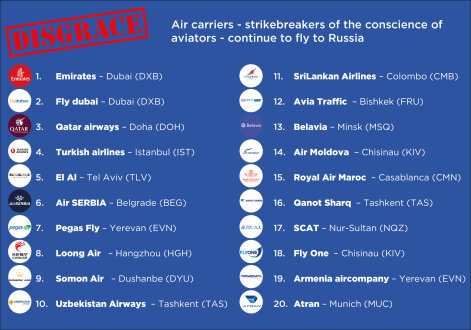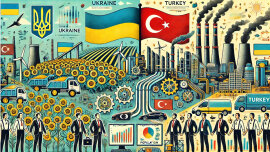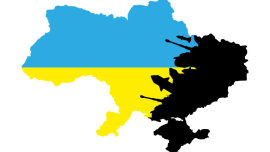All decisions of the Russian authorities in aviation after the imposition of EU and US sanctions are air piracy. And security on a pirate board can only be the one that the "gentlemen of fortune" themselves rely on.
On March 18, an engine caught fire in a passenger plane at Sochi International Airport before takeoff. The crew did not take off. Passengers were disembarked and no one was hurt. The Sochi-Orenburg flight was supposed to be operated by Nordwind Airlines on a Boeing 737 aircraft. It is good that the aircraft is technically reliable (the manufacturer reserves the main systems), and more serious consequences were avoided. In our company, engineers will not remember such incidents with aircraft of this modification. But in the Russian Federation, this will now become a regular situation, and the safety of passengers on domestic flights cannot be guaranteed.
EU and US sanctions have deprived Russian airlines of access to up-to-date technical documentation, so they cannot perform proper maintenance of Airbus and Boeing aircraft. Continue to operate them illegally and unsafe for the lives of passengers. But for the authorities of the Russian Federation, probably, people's lives are not the most important thing. Federal Air Transport Agency opens a new page in its history - air piracy.
«Steal» and «frame someone»
Since more than 35 countries have closed the skies for the Russian Federation, lessors are withdrawing their aircraft, and they are arrested outside the Russian Federation. Even China, which did not support the sanctions, refuses to participate in the gamble of the Federal Air Transport Agency. Thus, BOC Aviation, in which Bank of China owns a controlling stake, after helping Pobeda Airlines return Boeing 737-800 passengers from Istanbul to Russia, terminated contracts with Russian air carriers, and this is 18 aircraft from " Pobeda, Ural Airlines, S7 Airlines and AirBridgeCargo.
Convinced that it was impossible to circumvent sanctions, the Russian authorities decided to nationalize foreign aircraft for domestic flights. On March 4, the State Duma adopted a law that allowed the issuance of certificates of airworthiness to foreign aircraft, which are leased from Russian airlines. The law also gives a delay in the certification of technical means of transport security (probably, they are counting on the imminent lifting of sanctions). Simply put, the State Duma allowed these aircraft to be stolen from lessors. I will resort to marginal slang here, because the implementation of this law is nothing more than a crime with a threat to the lives of passengers.
The next thing the State Duma did with this law was to “frame” the partners. According to the rules of the ICAO (International Civil Aviation Organization), the state-registrar is responsible for everything that happens to the aircraft. In Russia, 85% of the civil air fleet is registered in Bermuda. Bermuda was one of the first to stop the airworthiness certificates of aircraft for Russian air carriers. After all, if they cannot be properly serviced due to sanctions, then it is dangerous to fly them. Changing the registration of foreign aircraft to Russian violates international rules, and no one recognizes this. It turns out that formally Bermuda remains responsible for their operation.
The plane is not a cart
Air travel is a service sector with increased risk and therefore with increased security guarantees. Here, monitoring and control of aircraft operation is a rigidly centralized system, built to the requirements of the manufacturer. An obligatory component of aircraft operation is its maintenance. Any maintenance is carried out according to the technical documentation of the manufacturer (AMM - Aircraft Maintenance Manual, SRM, CMM, SWPM, etc.) and in constant coordination with the manufacturer.
The world air transportation market is dominated by two aircraft giants - the American Boeing and the European Airbus. Aircraft of their production in the air fleet of the Russian Federation within 800 aircraft. Now legally they cannot be taken off to the sky - except perhaps to return them to lessors. EU and US sanctions prohibit aircraft concerns from selling aircraft, spare parts, and providing the Russian Federation with any technical documentation in the aerospace industry. Thus, the Russian Federation is completely excluded from the centralized global system of air transportation.
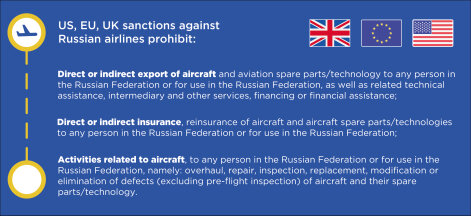
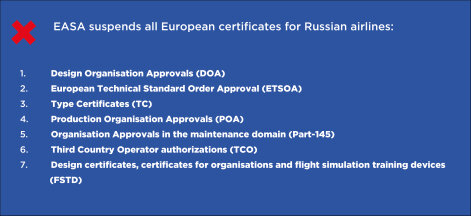
Without the technical documentation of the manufacturer, you cannot perform certified maintenance, which means you cannot operate the aircraft. Maintaining flight safety is an ongoing process. To do this, at least every 24 or 48 hours (depending on the type of aircraft and regulations), operational (linear) maintenance is carried out, during which most defects are eliminated. This requires consumables: oil, hydraulic fluids, gaskets, etc. Let's say that Russian airlines still have some stock for line maintenance. We at UIA buy them for a relatively long period. But what to do when the consumables will run out?
Even on the plane, a lot of units with a limited resource are installed, which are limited by calendar terms or flying time. If which unit fails during operation, what then? What to do if a bird gets into the engine? You can’t buy an aircraft unit somewhere, install it on an aircraft and repair it on your own. To have the unit repaired, it is taken to an EASA approved facility. After repair, a new EASA certificate is issued for this unit (EASA Form-1, FAA Form 8130-3, etc.) with a repaired/overhauled/inspected status, and if a new unit is a new certificate.
There is also basic maintenance, which requires not only consumables, but also spare parts, special tools, and equipment. Suppliers are already massively refusing to supply spare parts to the Russian Federation, although this is officially allowed until March 28. Even China refused. Due to the lack of spare parts, the largest cargo carrier Volga-Dnepr has already stopped flying on Boeing aircraft.
Flight safety is ensured only if all types of maintenance are carried out strictly according to the technical documentation and under the control of the manufacturer. The whole sector of air transportation is based on this.
Of course, anything is possible in Russia today. They can repair themselves with certificates canceled by EASA. They can also barbarically reinstall components from one aircraft to another. They can fill in Lukoil oil instead of certified aviation oil Mobil Jet, Aeroshell, BP, Turbonicoil, and ruin the engines. Maybe they will come up with something else, but it will not lead to anything good.
For example, one of the freshest decisions of the Russian Federation is to take the old Soviet IL-86 passenger planes into the sky, and introduce three of them into the fleet of the private airline S7 Airlines (they will still be completed!). But since 2008, this airline has completely switched to Airbus, Boeing and Embraer airliners. Pilots do not have the necessary skills to fly Soviet aircraft, just as there is no training base for their training. The risks for flight safety on the IL-86 still remain high.
The Russian authorities intend to hide security problems so that passengers do not refuse to fly. After a serious incident, the culprit will be appointed and punished exponentially, and the true reasons will be hidden even more carefully. Russian aviators themselves understand this.
At the MRO Russia & CIS conference, a senior official from Federal Air Transport Agency, who was in charge of maintaining of airworthiness, said that it is not so easy to change the registration of foreign aircraft, because this violates agreements between airlines and aircraft lessors. After that, he was immediately fired with the wording "for violating prohibitions".
Don't do business with pirates and terrorists
Insurance of foreign aircraft nationalized in the Russian Federation is a fiction. 85% of the Russian air fleet was insured by the Russian companies «Ingosstrakh» and «Alfa Insurance», and they are under sanctions. For flights to Europe, you need insurance in countries with a credit rating in the A range. For example, UIA insures international flights from London companies.
The insurance companies of the world have included the Russian Federation in the list of countries with increased risks - Sudan, Somalia, Belarus, Iran, Pakistan, that is, either where pirates dominate, or where terrorists operate. It is not clear to me why this circumstance does not bother the European air carrier Royal Air Maroc, which continues to fly to the Russian Federation.
Russians are now looking for reinsurance in countries with the same credit rating as the Russian Federation - in the B range, for example, in Turkey. Although in Turkey they risk losing the plane, as it will be arrested at the request of the owner or lessor. By the way, 78 planes of Russian airlines have already been arrested abroad. But if they continue to operate international flights, there is probably an agreement with the host.
It is clear that the Russian market means big money. So, with the first easing of restrictions on air travel due to Covid-19 in the 2021 season, passenger traffic from the Russian Federation quickly recovered. Compared to 2020, Turkey increased by 62% up to 4 million trips, to Egypt - by almost 100% up to 800 thousand trips, to the UAE - by 39% or 462 thousand trips, to Cyprus - by 92% or 415 thousand trips.
And besides Cyprus, which closed the skies for the Russian Federation, the airlines of these countries and many others continue to serve flights from and to the Russian Federation.
Leaseholders also lose money. Deposits made by airlines for aircraft leasing (about $600,000 each) are either frozen if they are in Russian banks. If the lessor signed the contract without making deposits by the airline (for example, if it belongs to the state), then the planned revenues will not be received. But the air carriers of the Russian Federation cannot withdraw their money from the accumulated reserves for maintenance reserves, since the country is disconnected from swift, and the US and the EU have banned payments in their currencies and even the supply of cash dollars and euros. As a result, lessors are left without planes and money, and Russian airlines are left without their own money, but with stolen planes. But in this case, the airline's benefit is not measured in money!
Strikebreakers of joint liability of aviators
It's not even about morality. Although for me personally, of course, it is important how someone reacts to the war crimes of the Russian army against my country. The fact is that the Russian authorities, by their actions, create a direct threat to the lives of passengers. If the Putin regime deliberately goes for this, then the more responsibility falls on us - the aviators. Today we need to state in solidarity that it is unacceptable to allow the Russian Federation to operate aircraft if it is objectively impossible to ensure flight safety. Those who continue to fly to the Russian Federation act as strikebreakers who split the international boycott.
There are up to two dozen such airlines. Among them are major carriers such as two airlines from the UAE FlyDubai and Emirates, Qatar Airways and Turkish Airlines, the Israeli national carrier El Al and the Serbian - Air Serbia. Moreover, Emirates operates flights to the Russian Federation with the largest passenger aircraft Airbus 380. And Air Serbia is trying to sit on two chairs: as the national air carrier of a candidate country for EU membership, and not to quarrel with the Russian Federation. Until March 21, inclusive, Air Serbia operated flights to Sheremetyevo, and on March 22, their board took off from Belgrade, circled and returned.
Thus, they endanger the entire sector of air transportation. Man, regardless of nationality, is helpless in the sky. The flight safety system has been built for many decades, and is being improved all the time. And people fly because they trust.
As aviators, we cannot sit back and watch as a precedent of unsafe flight safety is being created on an unprecedented scale. Russia should become a white spot on the map of world aviation, so that the accidents that this airspace expects will not be judged on the entire aviation of the world.
Air carriers - strikebreakers of the conscience of aviators - continue to fly to Russia
